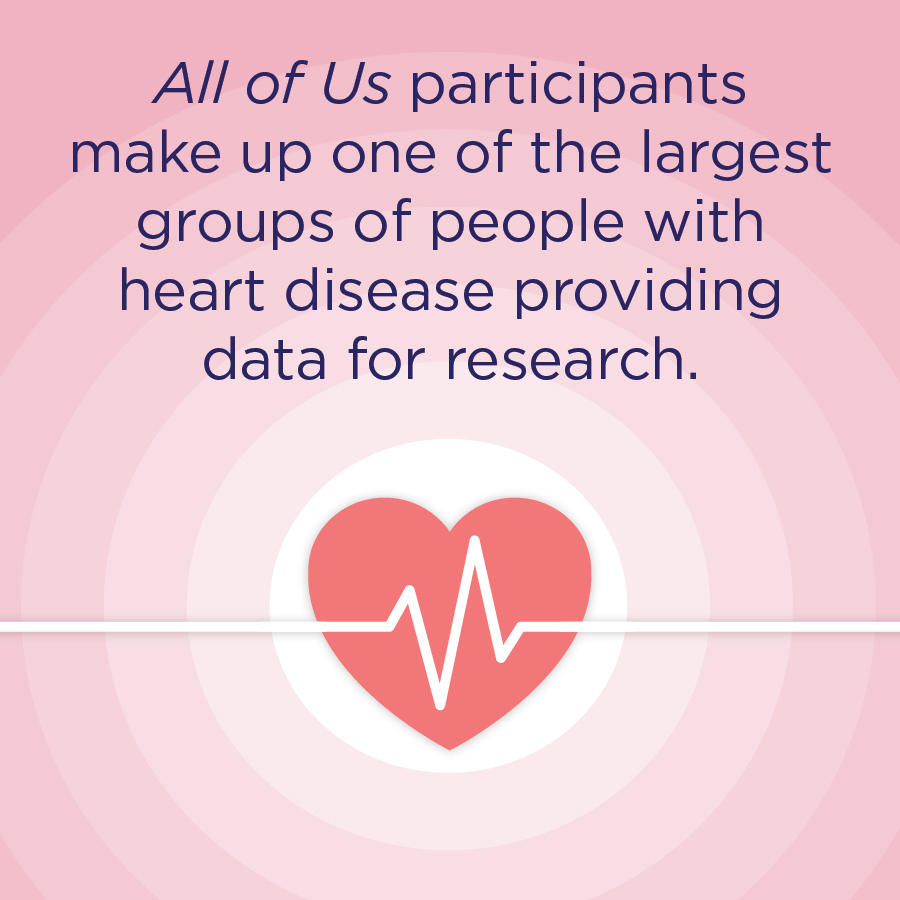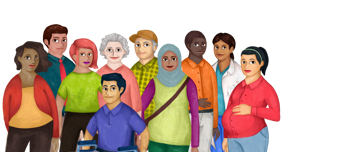
Heart disease is the leading cause of death in the United States. It is responsible for 1 in 5 deaths, and it disproportionately affects individuals from different racial and ethnic communities that have been historically underrepresented in medical research. More than 35,000 All of Us participants self-report having heart disease or other heart problems—including different conditions, such as atrial fibrillation, congestive heart failure, coronary artery disease, heart attacks, and heart valve disease—on a survey capturing their personal health history. This makes All of Us one of the largest groups of heart disease patients providing data for research. Researchers can dig deep using this survey data by combining it with other data types, such as electronic health records (EHRs), whole genome sequences, and Fitbit data.
“The All of Us dataset has incredibly rich phenotypic data that provides researchers the opportunity to investigate health conditions through many different lenses,” said All of Us Chief Medical and Scientific Officer Geoffrey Ginsburg, M.D., Ph.D. “The utility of this resource will only grow over time to help researchers better understand factors impacting chronic and prevalent conditions, like heart disease.”
Leveraging Data Types to Understand Cardiovascular Disease
Heart disease is one of the top three areas studied on the Researcher Workbench.1 In fact, there are more than 200 research projects on heart disease underway on the cloud-based platform and more than 15 peer-reviewed studies about heart disease that used the All of Us dataset. These publications show how researchers are using All of Us data to answer important questions about these conditions.
Researchers at the University of Miami raised new questions about whether Latino communities actually have lower rates of heart disease than non-Hispanic White people, despite having higher risk factors—the so-called “Latino Paradox.” The team found that Latino participants included in the analysis have significantly higher rates of heart disease than non-Hispanic Whites do. When discussing the project, Olveen Carrasquillo, M.D., M.P.H., said that All of Us was the missing piece in understanding the “Latino Paradox.” “You need big datasets with high [Hispanic and Latino] representation and large comparison groups to effectively look into this paradox,” he said, “That’s what’s been missing, and that’s where All of Us comes in.”
A recent study published in Nature Medicine examined the relationship between daily step counts and chronic disease. To look at this connection, researchers compared All of Us data from personal Fitbit devices with data from EHRs. The team concluded that taking at least 8,200 daily steps was associated with a lower risk for certain health conditions, including chronic diseases such as high blood pressure, obesity, and diabetes. The study also uncovered new links between higher daily step counts and lower risk for sleep apnea, depression, and acid reflux.
Researchers at Brigham and Women’s Hospital in Massachusetts affirmed the usefulness and validity of the All of Us dataset for cardiovascular studies by showing that the prevalence of hypertension in different participant populations in the All of Us dataset mirrored the hypertension prevalence reported by the Centers for Disease Control and Prevention’s well-known National Health and Nutrition Examination Survey. When discussing the study, lead author Dr. Paulette Chandler said that the diversity of participants and data types was crucial: “We had a large and diverse cohort of individuals who were on blood pressure medications and had at least two measurements of elevated blood pressure recorded.”
Driving Discovery About Health Disparities
Because the All of Us dataset is one of the largest and most diverse of its kind, it can help researchers better understand health disparities and advance health equity. These studies and others like them demonstrate the potential of All of Us to further our understanding of heart disease, particularly in communities that have been historically underrepresented in health research.
Among the disparities in heart health: in 2018, African Americans were 30% more likely than non-Hispanic Whites to die from heart disease and American Indians and Alaska Natives were 50% more likely than non-Hispanic Whites to be diagnosed with coronary heart disease.
All of Us offers abundant data for researchers interested in studying disparities like these. Beyond the 35,000+ participant survey responses reporting heart disease, All of Us has EHR data from more than 115,000 participants that suggests they may have heart disease.
“Researchers are now drawing on data from multiple sources that allows them to find new connections to help us better understand why health disparities exist in cardiovascular disease and how to formulate effective solutions,” said Dr. Ginsburg. “Our goal is to contribute to a novel portfolio of risk assessments, diagnostics, and treatments to advance precision health for all.”
More than 400,000 participants have joined All of Us since 2018. Participants contribute different kinds of data, including survey responses, EHRs, biosamples, physical measurements, and information from wearable technologies such as, Fitbit devices. This data is made available through All of Us’ secure, cloud-based platform, which allows researchers to conduct sophisticated analyses quickly and easily with a variety of tools. All of Us invites researchers affiliated with U.S.-based non-profit, health care, and academic institutions to register to use the Researcher Workbench.
1Lunt C, Mayo K, Master H, Growing a research ecosystem in the cloud: Early insights from the All of Us Research Program; (Abstract #PB3215). Presented at the annual meeting of the American Society of Human Genetics, October 27, 2022, in Los Angeles, California.
This article appears in the February 2023 issue of All of Us Research Roundup. Subscribe to receive future issues of the bimonthly researcher newsletter.
View the full February edition of the All of Us Research Roundup here.
All of Us is a registered service mark of the U.S. Department of Health & Human Services (HHS).
